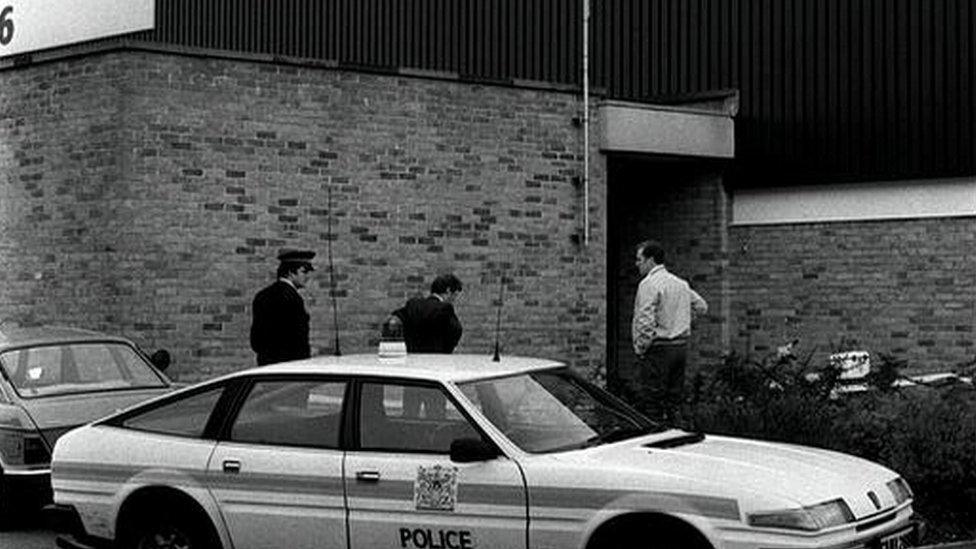Panama Papers: Mossack Fonseca link to Brink's Mat robbery
- Published

Three tonnes of gold stolen was stolen in the 1983 Brink's Mat robbery
A huge leak of confidential documents has revealed some of the cash from one of Britain's most notorious crimes was laundered using a company set up by a Panamanian law firm.
Documents show Mossack Fonseca formed a company that was used to launder money from the 1983 Brink's Mat robbery.
The stolen bullion, worth £26m at 1983 gold prices, disappeared offshore.
Mossack Fonseca says it cannot comment on specific cases and it has never been charged with criminal wrong-doing.
Commenting "would be a breach of our policies and legal obligation to maintain client confidentiality", it said.
The revelations came as part of a leak of 11 million documents showing how Mossack Fonseca helped some of the world's wealthiest and most powerful people to launder money, dodge sanctions and evade tax.

Panama Papers - tax havens of the rich and powerful exposed
Eleven million documents held by the Panama-based law firm Mossack Fonseca have been passed to German newspaper Sueddeutsche Zeitung, which then shared them with the International Consortium of Investigative Journalists, external. BBC Panorama is among 107 media organisations - including UK newspaper the Guardian, external - in 76 countries which have been analysing the documents. The BBC doesn't know the identity of the source
They show how the company has helped clients launder money, dodge sanctions and evade tax
Mossack Fonseca says it has operated beyond reproach for 40 years and never been accused or charged with criminal wrong-doing
Tricks of the trade: How assets are hidden and taxes evaded
Panama Papers: Full coverage; follow reaction on Twitter using #PanamaPapers; in the BBC News app, follow the tag "Panama Papers"
Watch Panorama on the BBC iPlayer (UK viewers only)

Masked robbers raided the Brink's Mat warehouse near Heathrow in 1983 and escaped with three tonnes of gold.
Leaked documents show in 1985 Mossack Fonseca set up a company called Feberion for a property dealer called Gordon Parry in 1985.
An internal memo circulated the following year shows that Mossack Fonseca was warned that Parry was laundering money from the Brink's Mat robbery.
It was written by Jurgen Mossack - one of the firm's founders - following a meeting with an associate who was helping to run Feberion.
It says: "He informed me that the owner of this company apparently is involved in the management of money which represents proceeds from the famous theft from Brink's Mat in London.
"The company itself has not been used illegally, but it could be that the company invested money through bank accounts and properties that was illegitimately sourced.
"They want to resign as directors and suggest that we do the same."
Jurgen Mossack didn't immediately resign as a director, even though he knew that Feberion was being used to launder stolen cash.
Feberion was owned by two bearer shares, which meant that whoever held the share certificates had control of the company.
British detectives investigating the robbery had seized possession of the two shares, making it impossible for Parry or the company to transfer any funds.
But on 3 September 1987, Feberion issued 98 new shares and Parry regained control of the company.
Parry was finally caught in 1990. He was sentenced to 10 years in prison in 1992 after being convicted of laundering money from the robbery.
A huge leak of confidential documents has revealed how the rich and powerful use tax havens to hide their wealth
Gerard Ryle, director of the International Consortium of Investigative Journalists (ICIJ), said the leaked documents covered the day-to-day business at Mossack Fonseca over the past 40 years.
"I think the leak will prove to be probably the biggest blow the offshore world has ever taken because of the extent of the documents," he said.
The documents show 12 current or former heads of state and 60 people linked to current or former world leaders in the data.
Revelations include:
The Icelandic Prime Minister, Sigmundur Gunnlaugson, had an undeclared interest linked to his wife's wealth and is now facing calls for his resignation
A suspected billion-dollar money laundering ring involving close associates of Russian President Vladimir Putin
Secret offshore companies linked to the families and associates of Egypt's former president Hosni Mubarak, Libya's former leader Muammar Gaddafi and Syria's President Bashar al-Assad
The documents also shed light on how Mossack Fonseca offered financial services designed to help business clients hide their wealth
In a statement, Mossack Fonseca said: "Your allegations that we provide structures supposedly designed to hide the identity of the real owners, are completely unsupported and false.
"We do not provide beneficiary services to deceive banks. It is difficult, not to say impossible, not to provide banks with the identity of final beneficiaries and the origin of funds."
Jennie Granger, a spokeswoman for the UK's tax authority, HM Revenue and Customs (HMRC), said the organisation had received "a great deal of information on offshore companies, including in Panama, from a wide range of sources, which is currently the subject of intensive investigation".
She said the ICIJ had been asked to share all its data with HMRC.